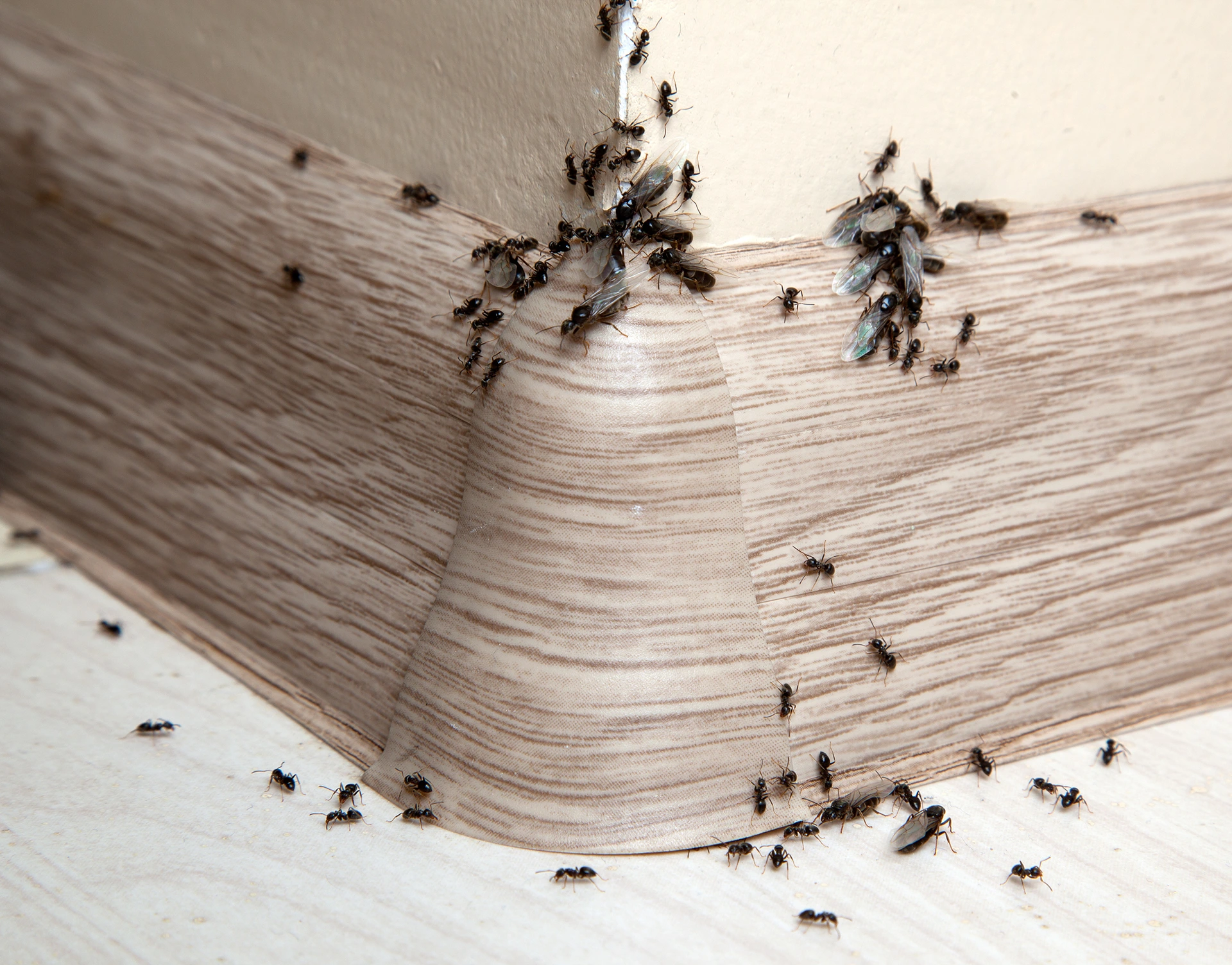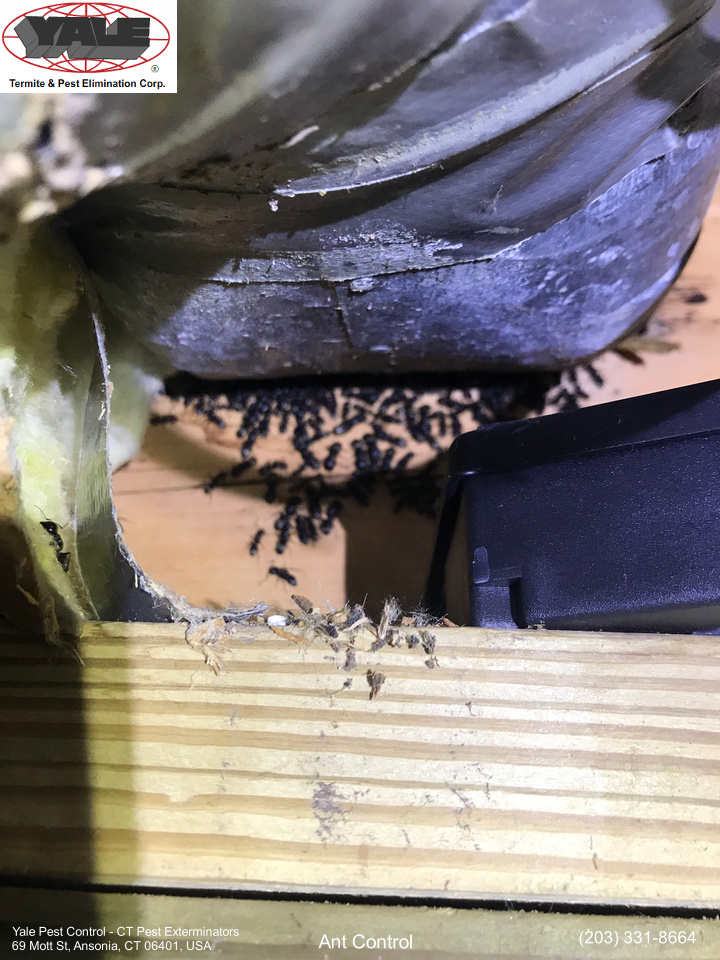
With over 12,000 species, ants are among the most diverse creatures in the world. These include pavement ants, which can be found living in colonies under rocks and sidewalks. Even if the pavement ant colony isn't anywhere near your home, pavement ants can be a bothersome pest. Your home is a prime target for them, because pavement ants travel great distances in search of food and water.
So are pavement ants aggressive? Pavement ants, while not extremely aggressive, can bite and sting if provoked. Homeowners and their properties may not be at risk from pavement ants. This insect is more of a nuisance when they invade households and attempt to share or steal food.
Pavement ants are generally not classified as a dangerous ant species. In fact, pavement ants seek to avoid conflict rather than stinging to protect themselves. Pavement ants are a relatively docile species of ant that are non-aggressive and occasionally come into direct contact with people, despite their ability to sting and bite.
But while they represent minimal direct risk, they are a major nuisance pest that can pose an indirect threat by invading and contaminating food. Pavement ants will devour meats, grease, cheese, sugar, and nuts if they sneak their way into your home. They may also try to collect honeydew and dead insects around the home.
Pavement ant colonies find refuge beneath the soil in yards, making pest management difficult for homeowners. Large swarms of these pests can be a nuisance near kitchens and lawns, particularly during mating swarms. Although this insect is primarily an inconvenience to have invading your household, their behavior and migration routes may cause them to spread harmful bacteria into your food storage.
The ants you encounter in your cupboard or on your kitchen counter may have previously been wandering around in decaying rubbish or a bacteria-infested drain pipe. Worker ants can also contaminate food with bacteria like E. coli. or Salmonella, which are potentially hazardous to human health and their digestive tracts.
Even though pavement ants are rarely aggressive, this ant species can bite or sting when disturbed. Although an ant bite or sting are too weak to puncture human skin, they can trigger allergic reactions in those who are sensitive.
Pavement ants prefer to live outside, building colonies along sidewalks. Worker ants will make their way back to the concrete foundations of homes in search of food and water, and will build their nest beneath flooring or in insulation located behind walls. Even though they aren't aggressive, it's still necessary to be able to identify them so that an extermination and pest management strategy may be implemented.
Pavement ants are among the most widespread ant species encountered in both urban and suburban settings. Pavement ants are dark brown to black in appearance and grow to be about 1/8 of an inch long, while queens can be much larger. They have 12 segmented antennae.
The end of one of a pavement ant's antenna features 3 segmented clubs. The parallel grooved lines running down their dark brown bodies from head to thorax, as well as the spines protruding from their thorax, help differentiate them from other ant species.
Pavement ant colonies typically have multiple queens and a large number of workers. The multiple queens lay eggs to start new pavement ant colonies. The queen's brood is then cared for by pavement worker ants until they reach adulthood. Broods are moved from place to place during their development to protect them from changes in moisture and temperature.
Pavement ants consume food from many different sources, including meat, live and dead insects, grease, seeds, and aphid honeydew. They enjoy oily foods and are capable of eating a wide variety of human food. They search for food for their colony and create scent trails from their nest to food sources. When large numbers of pavement ant workers infest a kitchen or outdoor patio, they can become a nuisance.
Pavement ants can be found all over the country and are a major problem in North America. These ant species get their name from the fact that they build their nests in a crack or crevice in driveways and under sidewalks, depositing the soil on top of the pavement cracks.
Pavement ants also live beneath logs, stones, bricks, patio blocks, and wooden boards. Pavement ants may also make their nest in mulch or open soil near building foundations. They can also establish their homes indoors, such as beneath floors, within walls, and inside insulation. Because pavement ant nests are difficult to find, the most effective approach to deal with a pavement ant infestation is to hire a pest control company.
Before becoming mature adults, pavement ants pass through the larval, pupal and egg stages. When winged male and female pavement ants swarm in June and July, they reproduce. The females search for a different nesting site after mating and become the queen of a new pavement ant colony.

Having ants in your home can be a bit of a challenge. It's not only annoying to have ants crawling around, but a colony of ants can also cause substantial damage. While pavement ants aren’t an aggressive ant species, it’s still unsanitary to have them in your home. Food is unquestionably contaminated by ants in the house. They carry bacteria that can be spread through food or an open wound.
Some ant species, such as fire ants and harvester ants, are known to be aggressive stinging insects. Carpenter ants, on the other hand, are infamous for causing structural damage. It's crucial to be able to differentiate these ant species to be able to properly eliminate the pavement ant infestation.
Luckily, there are several simple and efficient techniques for keeping ants out of your home. Simply follow these suggestions, and you'll be able to prevent these insects from sneaking in your home.
The first line of defense against ants is to keep your household clean. Take away the trash, sweep up food crumbs, and don't leave dirty dishes lying around the house. This eliminates the possible food sources that might attract a worker pavement ant. Spray vinegar and water solution around bowls of pet food to prevent ants from feasting there.
You'll almost certainly see more ants where you see a single one roaming around. This is important to keep in mind, because ants produce a scent trail that other pavement ant workers follow. Sweeping or mopping is insufficient to remove the odor. Instead, make a spray bottle with 1 part vinegar and 3 parts water for a safe and simple technique to eliminate ants in the house.
Spray areas where you've noticed the worker pavement ant before. This method will discourage future outdoor nesting ants from foraging for food inside the house. Although, not all ants that enter the house are attempting to create a colony; vinegar and water will not prevent ants from nesting inside. You'll have to use alternative ant control measures, such as ant bait, to get rid of them.
After you've gotten rid of the ants, make sure they don't return back into your home. After caulking and sealing cracks and openings, apply insecticide around doors and windows. One technique to get rid of ants is to use an insecticide spray that contains bifenthrin, deltamethrin, or permethrin. You may also opt to spray insecticide on pavement cracks around your property.
Just enough to moisten the surface, spray a 4 inch wide line around access points. When the spray dries, it creates an invisible film that drives ants out of the house. Spray the insecticide in the spring to keep ants at bay. But keep in mind that this method only works to keep ants out. This ant control method won't kill any ants already inside, and it may compromise the application of ant baits around the household.
If you've noticed scout ants in your home, you should start putting bait traps in the locations where you've seen them. You don't have to kill the worker pavement ant immediately. While an ant bait may momentarily attract more ants, their poisonous chemical will be brought back to the pavement ant colony and may assist to eradicate the colony as a whole, rather than just the few pavement ant workers that sneak their way into your home.

While pavement ants aren’t an aggressive ant species, they will still manage to find their way into your home. In such circumstances, it’s best to remove their scent trail that connects the pavement ant colonies into your property. Pavement ants will choose to stay outside, if they don't have easy access to food or water inside your home. Although it’s ideal to use ant control and prevention strategies, it’s sometimes impossible to avoid an ant infestation.
When preventative strategies fail to eliminate your ant colony, it's time to call in the insect extermination experts at Yale Pest Control. Not only do we get rid of pavement ants, but also odorous house ants, sugar ants, and pharaoh ant species among others. We can also assist you with wildlife control before they cause any structural damage to your property. Schedule a consultation with us today to learn more about us and how we can help you.